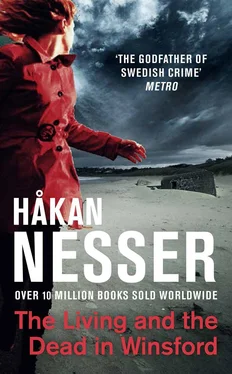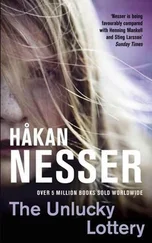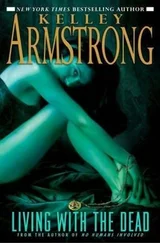Håkan Nesser - The Living and the Dead in Winsford
Здесь есть возможность читать онлайн «Håkan Nesser - The Living and the Dead in Winsford» весь текст электронной книги совершенно бесплатно (целиком полную версию без сокращений). В некоторых случаях можно слушать аудио, скачать через торрент в формате fb2 и присутствует краткое содержание. Год выпуска: 2013, Издательство: Mantle, Жанр: Криминальный детектив, на английском языке. Описание произведения, (предисловие) а так же отзывы посетителей доступны на портале библиотеки ЛибКат.
- Название:The Living and the Dead in Winsford
- Автор:
- Издательство:Mantle
- Жанр:
- Год:2013
- ISBN:нет данных
- Рейтинг книги:4 / 5. Голосов: 1
-
Избранное:Добавить в избранное
- Отзывы:
-
Ваша оценка:
- 80
- 1
- 2
- 3
- 4
- 5
The Living and the Dead in Winsford: краткое содержание, описание и аннотация
Предлагаем к чтению аннотацию, описание, краткое содержание или предисловие (зависит от того, что написал сам автор книги «The Living and the Dead in Winsford»). Если вы не нашли необходимую информацию о книге — напишите в комментариях, мы постараемся отыскать её.
The Living and the Dead in Winsford — читать онлайн бесплатно полную книгу (весь текст) целиком
Ниже представлен текст книги, разбитый по страницам. Система сохранения места последней прочитанной страницы, позволяет с удобством читать онлайн бесплатно книгу «The Living and the Dead in Winsford», без необходимости каждый раз заново искать на чём Вы остановились. Поставьте закладку, и сможете в любой момент перейти на страницу, на которой закончили чтение.
Интервал:
Закладка:
Some sort of menace? Something warning of danger, something telling me that if I wasn’t careful I would find myself in a right mess?
Rubbish, I thought. Figments of the imagination.
Then again, what had I expected? I had divested myself of my old life on that Polish beach: I had put an end to it just as conclusively as one breaks a bone off a chicken. Absolutely everything had changed, nothing was the same as before. Isn’t that the fact of the matter? If you wanted, you could argue that it was Martin who had set everything in motion when he raped that waitress in the hotel in Gothenburg — or left his sperm on her stomach, at least. What I did in the bunker had simply been a natural reaction, albeit a bit on the late side, albeit a bit drastic and very much unplanned — something done in a flash, as they say. But nevertheless one thing had led to another, and there was a clearly linked series of causes and effects for the left side of the brain to revel in. . Yes indeed, there was a lot that one could maintain and think about in the back of one’s mind, surrounded by this open, peaceful moorland with bracken, cheerful-looking gorse and surly-looking heather, mud, grass and wild ponies: but when all was said and done, the biggest problem, the distressing point, was my own mind which simply couldn’t calm down and rest. Couldn’t stop producing all these words and half-baked analyses, futile and would-be wise, non-stop, every day, every hour and every minute until at the predestined moment my heart stopped pumping oxygen-laden blood into these highly overrated rantings.
The real world, I thought. I need some kind of context, otherwise I shall succumb unnecessarily. A dog isn’t enough.
And so I made up my mind to visit the Winsford Computer Centre during the afternoon. What had Margaret Allen said? Between eleven in the morning and six in the evening?
It was Alfred Biggs who was on duty. He was a mousy little man wearing clothes that were too big for him. As if he had shrunk after buying them, or inherited them from an older brother who had died in some war or other a long time ago. His spectacles with black plastic frames were also too big: I had the impression that he was trying to hide behind them, and that his smile was shy and somewhat introverted.
‘You must be that writer,’ he said when we had introduced ourselves. ‘Margaret told me about you.’
‘Is she not here today, then?’
‘No, Saturdays are mine. Margaret only works here two days a week. She works at the library in Dulverton as well.’
I nodded. ‘Yes, she said that.’
‘But I live more or less next door. I’m retired, so I have all the time in the world.’
‘I’m pleased that I can come here occasionally — I don’t have an internet connection where I’m living.’
‘You’re always welcome. That’s the point of this place. If we’re not open, all you need to do is to knock on my door — that red one just round the corner.’
He pointed in the direction of the church.
‘So this is Castor, is it?’
Castor heard his name and stretched his nose out towards Alfred Biggs, who stroked him cautiously on the head. He smiled again, and I tried to assess it. There was something odd about his teeth. Something his lips did their best to conceal. He showed me where I could sit, and asked if I would like a cup of tea. Just like the previous occasion, there was nobody else in the room; I accepted and made a mental note to bring with me some sort of biscuits the next time I came.
When I had received my cup, I sat down to check our e-mails — first mine, and then Martin’s. Alfred went back to his book. Castor settled down under my table.
There was only one message in my inbox. Katarina Wunsch. The title was: London? I swallowed, then opened it.
Hi there Maria! Something very odd happened a few weeks ago when my husband and I were in London, and I really must ask you about it, no beating about the bush. We met a woman in Hyde Park and I was quite certain it was you. We said hello but she spoke English and said it was some kind of mistake. It was very awkward. My husband and I talked about it afterwards, and I simply can’t get it out of my head. Was it really not you? It feels so odd — forgive me if I’m being presumptuous. Love, Katarina.
I don’t know how she had got hold of my new e-mail address, but I assume she’d got it from the Monkeyhouse. I don’t know how easy or difficult it is to find out information like that, but in any case I thought it over for quite a while before writing the following reply:
Hi Katarina! Great to hear from you, it’s been ages since the last time. But I really have no idea who that woman might have been. One thing is clear, of course: it wasn’t me. Martin and I have been down here in Morocco for quite a while now. He’s busy with some writing project or other as usual, and I’ve accompanied him mainly in order to avoid a Swedish winter. We’ll be staying here until May next year. I hope all is well with you and yours — let me know if you bump into me again! Love, Maria.
I hesitated for a while before writing that last sentence, but thought I might as well demonstrate that I was taking it lightheartedly. I sent it off and went over to Martin’s inbox.
Seven new messages. Four from people who were presumably colleagues of one kind or another, brief messages not requiring an answer — not immediately, at least. One was from a student complaining about the mark he had been given for an essay: it was several pages long, I’d had more than enough after about half of it and trashed it.
The two remaining messages were from Eugen Bergman and from G. I waited with G and read what Bergman had to say — I needed to write to him today as I hadn’t replied to his previous message.
My dear friend, I hope you have arrived safely and that everything comes up to expectations. Stockholm is grey and miserable: I must say I’m a bit envious of you. Any old halfwit should be able to cobble together something readable while spending winter in a nice warm place like the one you two have ended up in. The only news from the publishing world is that we’ve got our furry-gloved hands on a couple of so-called celebrity memoirs — an ice hockey legend and a reformed murderer — but they’re not the kind of thing you’d want to hear more about.
Do keep me informed: if nothing else let me know that all is going to plan.
All the best, Eugen B.
PS — by the way, some woman by the name of Gertrud something-or-other is keen to get in touch with you. Can I give her your e-mail address?
Before replying I tried to trace some previous messages Martin had sent to his publisher, but as I was doing everything via the internet this wasn’t possible. Old messages are kept for such a short time, and as usual I hadn’t taken our own computers with me this time either. Anyway, I bashed out a few lines to Bergman to say that we had indeed arrived, that all was well and that he didn’t need to worry. I was writing six to eight hours every day, and everything was proceeding as it should. The nearest town of any size was Rabat. I also said he was welcome to give my e-mail address to Gertrud, and that I thought I knew who she was.
When I was satisfied with this basic stuff and had sent it off, I opened the message from G.
Where are you? What are you up to? No reply to my last message, it’s a week and I’m getting frustrated. Please contact me. ASAP. G
ASAP? That meant ‘as soon as possible’, unless I was much mistaken.
‘What are you up to?’
I felt a little bit worried, but just then two young girls came in through the door. They greeted Alfred Biggs politely, glanced at me and Castor, then each of them sat down at a computer with their backs towards us. Alfred Biggs got up and went to help them with something.
Читать дальшеИнтервал:
Закладка:
Похожие книги на «The Living and the Dead in Winsford»
Представляем Вашему вниманию похожие книги на «The Living and the Dead in Winsford» списком для выбора. Мы отобрали схожую по названию и смыслу литературу в надежде предоставить читателям больше вариантов отыскать новые, интересные, ещё непрочитанные произведения.
Обсуждение, отзывы о книге «The Living and the Dead in Winsford» и просто собственные мнения читателей. Оставьте ваши комментарии, напишите, что Вы думаете о произведении, его смысле или главных героях. Укажите что конкретно понравилось, а что нет, и почему Вы так считаете.












